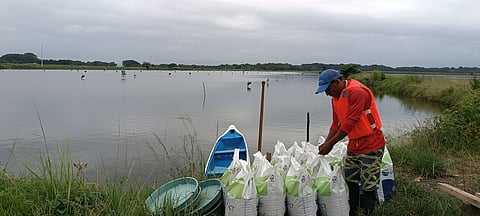

Ecuador's National Chamber of Aquaculture warned the effects of the power outages will worsen as the days go by. The aqua feed sector is one of the most affected.
In late September we learned that unplanned power outages were jeopardizing the Ecuadorian shrimp industry. Ecuador's National Chamber of Aquaculture (CNA) said then that the energy crisis could cause losses of up to USD 5 million a day (EUR 4.48 million). Last week, it updated this figure and warned that the fall could lead to a USD 75 million (EUR 68.7 million) monthly drop in shrimp exports.
Not only that, on behalf of the country's shrimp sector value chain, the CNA said that, if no action is taken, the effects of the power cuts announced by the National Electricity Operator CENACE on October 5 will worsen as the days go by.
As it did in late September, Ecuador's National Chamber of Aquaculture of Ecuador has insisted once again that the impact of these power outages affects the entire production chain. As we reported then, if in shrimp farms the lack of energy affects water pumping, jeopardizing oxygen conditions and the survival of the crustacean, industries such as shrimp feed manufacturing or processing, require minimum times to turn on their equipment.
In its latest statement, the CNA recalled that, since it is unable to compensate for the lack of electricity generating its own, the feed mills have seen their production capacity drastically reduced. This, it pointed out, puts at risk the supply of the most crucial raw material for producers.
It also highlighted that the same is true for processors, which share the same situation as feed manufacturers, facing outages of up to 13 hours a day, as 10-hour outages prevent equipment from restarting in a timely manner.
"The scenario proposed by CENACE places the shrimp sector in a critical situation. The lack of balanced feed that we are already beginning to register not only affects current production, but will force us to reduce shrimp seed densities, which means lower export volumes just in a season of greater demand, and in a particularly difficult year for our sector," explained José Antonio Camposano, Executive President of the CNA.
Likewise, Camposano also recalled that the association has requested the Ministry of Production, Foreign Trade, Investment and Fishing (MPCEIP) to insist before the electricity authorities on the need to have predictable rationing schedules and manageable time slots to mitigate the impacts.
"In cantons such as Durán, agreed schedules are not being met, resulting in incalculable losses in labor costs, damage to shrimp that cannot be processed on time, and equipment that is affected by unplanned outages," said the CNA Executive President.
Durán, in the province of Guayas, is one of the most important shrimp farming areas in Ecuador, and one of the areas categorized as industrial for which the CNA insisted on requesting a differentiated approach to electricity rationing. This area is home, for example, to BioMar's Ecuador shrimp feed plant, which recently obtained ASC Feed certification.
For all these reasons, Ecuador's National Chamber of Aquaculture has made a new appeal to the Ecuadorian authorities to improve transparency around the energy crisis. Its objective, said the CNA, is to understand its real scope and to be able to work on solutions that do not disproportionately affect the productive sector, on which 9 out of 10 jobs in the country depend.
"We understand that this crisis has not been generated by the current administration, but it is essential to improve decision-making processes and communication with the affected sectors. We reiterate our willingness to collaborate with the authorities and all the actors involved, seeking to protect an industry that is vital to the Ecuadorian economy and that supports almost 300,000 direct and indirect jobs," concluded Camposano.
